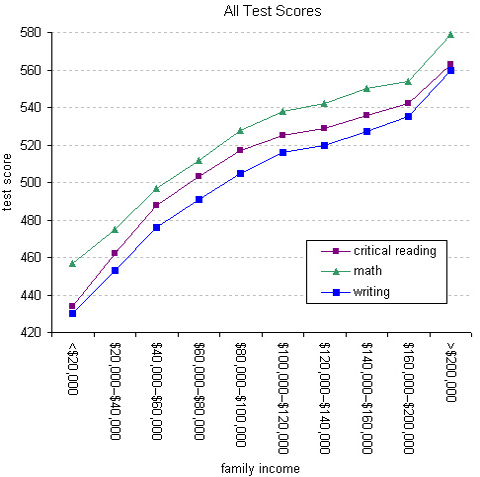For one reason or another, poor kids do worse in school than rich kids. Consider for instance this breakdown of SAT scores divided by parental income:

This graph tells us two important things. First, poor kids do indeed do worse on the main college admissions exam. Second, differential enrollment rates in college probably have to do with the fact that poor kids are not as qualified for college as their wealthier peers. That is, by the time college comes around, poor kids have already fallen really far behind. College costs doubtlessly impose additional barriers, but differential educational success prior to college seems to pose the most substantial barrier. From what I have seen, there are four main theories that attempt to explain this phenomenon.
1. Genetics
Greg Mankiw put forward the view that poor kids probably score lower for mainly genetic reasons. Specifically, Mankiw writes “Smart parents make more money and pass those good genes on to their offspring.” Mankiw does not develop this theory very much and it may not be fair to totally hold him to it, but it is not an uncommon view.
The problem with this view is the one Mankiw himself incidentally identified. If genes are an overriding factor, then children adopted into higher-income households should not do any better than their cohorts who are not. But as John Sides points out, that’s not what the data show.
2. Bad Parents
The second view is that poor children do worse because their parents are not good parents. This is similar to the genetic view except it is not bad genes that parents are passing on; instead, it is bad habits and lower levels of cultivation. There are both right-wing and left-wing versions of this view.
On the left, there is the culture of poverty theory. According to this theory, the conditions of poverty create a subculture with its own socialization, behaviors, and attitudes. That culture then transmits itself across generations, which accounts for why poor kids remain poor, and might therefore also account for why they do worse in school.
On the right, the reason poor parents are poor is because they are lazy, stupid, and otherwise self-destructive. The same thing that causes them to be poor — these behaviors — is what causes them to be bad parents, and therefore what causes their kids to not do well in school. Needless to say, this is not my view.
3. Effects of Poverty
The Effects of Poverty view is that the economic instability, deprivation, risk, stress, and neighborhood effects that accompany poverty best account for why poor students do not perform as well. There is substantial evidence that poor kids, even at the youngest ages, have elevated blood pressure, cortisol levels, epinephrene levels, and norepinephrene levels — all of which are indicators of stress. Poorer children move more often, which has all sorts of negative psychological effects. I could go on, but you get the gist: living in poverty is hard and makes learning more difficult.
4. Bad Schools
Technically, this is really a subset of explanation three, but it is such a massively influential one that it deserves its own number. The bad school theory is that schools in poorer areas are underfunded, mismanaged, and attract lower-performing teachers. As a result, poor kids do worse in school. This is the motivating hypothesis of the entire Education Reform Movement.
I dedicated a section of my long Education Reform Movement post a short while ago on this theory and why I think it is flawed. The short of it is that when you control for socioeconomic background, students that go to the same schools and very different schools tend to perform very similarly. If the schools are what make the difference, this is not what you would expect. Additionally, intense and widespread efforts at reforming schools and teaching models have had little to no success at improving the educational achievement of poor students.
Conclusion
These are — more or less — the four approaches to explaining why poor kids do worse in school. I personally find number 3 the most compelling and number 1 the least compelling, but there is also no reason why the real answer could not be a combination of the above. Hopefully this post brings some much needed clarity to this whole discussion.